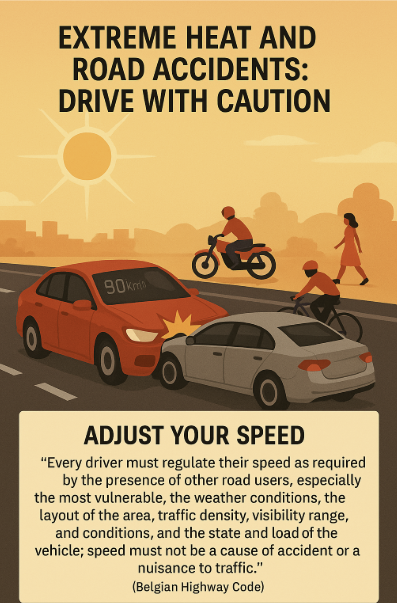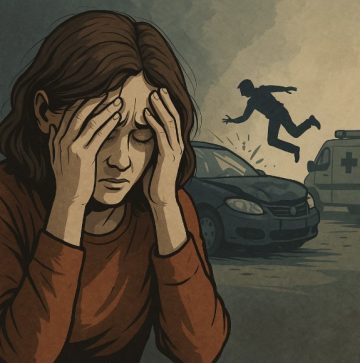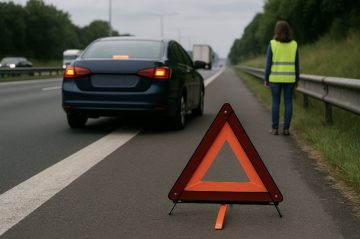🚗 Extreme Heat and Road Accidents: Why You Must Adjust Your Speed
Summer often brings sunshine, holidays and relaxation… but also heatwaves. This increasingly frequent weather phenomenon in Belgium should not be taken lightly — especially when driving. High temperatures significantly increase the risk of road accidents, for both drivers and vulnerable road users.
☀️ How does heat affect driving?
Driving in hot weather may seem harmless, but it has direct effects on safety. The following are common consequences:
-
Faster onset of fatigue, especially without air conditioning or on long journeys.
-
Dehydration, which reduces concentration and coordination.
-
Reduced alertness and slower reaction times.
-
Stress and irritability, which can lead to impulsive or aggressive behaviour.
📊 European studies have shown that the number of injury-related accidents increases during heatwaves. These effects are especially marked for elderly drivers, inexperienced young drivers and people taking heat-sensitive medication.
⚖️ What does Belgian traffic law say?
In Belgium, adapting your speed to the weather conditions is a legal obligation, not a mere recommendation.
📌 Article 10.1, first paragraph of the Belgian Highway Code:
“Every driver must regulate their speed as required by the presence of other road users, especially the most vulnerable, the weather conditions, the layout of the area, traffic density, visibility range, road conditions, and the state and load of the vehicle; speed must not be a cause of accident or a nuisance to traffic.”
In hot weather, this means:
-
Reducing your speed if the road is deformed or slippery (e.g. melting asphalt),
-
Being extra cautious around vulnerable users (pedestrians, cyclists, children),
-
Not overestimating your physical or mental abilities in the heat.
Failure to adjust your speed may amount to a traffic offence and can be considered a serious fault in the event of an accident.
🛠️ Common risks in hot weather
-
Tyre blowouts on overheated roads.
-
Slower braking reactions due to reduced concentration.
-
More vulnerable users on the roads, often also less alert.
-
Reduced tyre grip on softened or deformed road surfaces.
✅ Practical tips for driving safely in the heat
-
Adjust your speed, even if no special limits are posted.
-
Stay well hydrated, before and during your trip.
-
Avoid driving during peak heat hours (between 12 p.m. and 4 p.m.).
-
Take breaks every 1.5 to 2 hours.
-
Check your tyres, brakes and fluid levels before setting off.
-
Never leave a child, elderly person or pet in a parked vehicle, even for a few minutes.
💡 In summary
Heat has a direct impact on your ability to drive safely. As a driver, you are legally required to adapt your speed to the weather, as clearly stated in the Belgian Highway Code.
Driving cautiously in extreme temperatures isn’t just common sense — it’s your legal duty.
📞 In case of an accident or legal questions, feel free to contact me
Have you been involved in a road accident, or do you have questions about your rights and obligations as a driver?
As a lawyer specialised in traffic law, I offer support that is pragmatic, human and effective.




